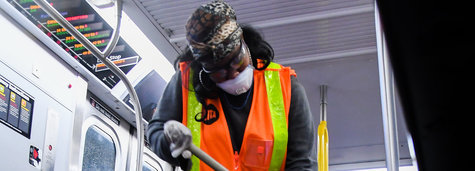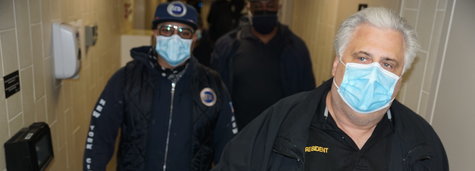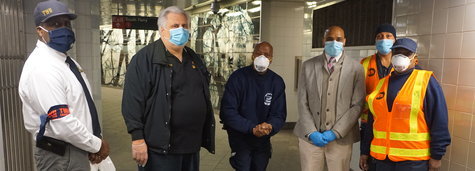M.T.A.’s Budget Ills Are Worse Than Accounts of Spitting
The train crawled to a stop. Ahead, somewhere in a tunnel below 96th Street on the West Side of Manhattan, a 20-foot section of rail had broken. It was a good moment — actually, a good half-hour — to review the headlines.
City bus drivers were taking off three months to recover from being spit upon, all the city newspapers reported on Tuesday. The information was released by transit officials, who said that 51 drivers assaulted by spitters in 2009 had taken, on average, 64 days off with pay.
It was the outrage du jour.
Except that maybe it wasn’t quite.
After a day of research, union officials said that, in fact, most drivers took either no time off or very little after such attacks.
Of 69 spitting cases in 2009, 34 drivers came back to work for their next shift, and 9 took less than 10 days off, said John Paul Patafio, a bus driver and organizer with Local 100 of the Transport Workers Union, which represents the bus drivers. Mr. Patafio said his statistics were based on official reports supplied by the transit agency.
The remaining 26 “took quite a bit of time, but they were examined monthly by their own doctors and transit doctors,” Mr. Patafio said.
“They all had two doctors agreeing that they had to be held out,” he continued.
Asked for comment, officials from the transit agency agreed that the union numbers were correct.
It hardly matters. The transit system in New York has turned into Greece: dead broke. Layoffs have started, service cuts will begin in a few weeks, and, while some careful trimming has been done, no one has come forward with a glimmer of a solution.
“This is government by anecdote,” said Gene Russianoff, staff lawyer for the Straphangers Campaign, a riders’ advocacy group.
During the past five years, transit spending grew by 7 percent annually, which was twice the rate of inflation. The union recently won an arbitration award granting an 11.5 percent pay increase over three years.
Over the last decade, the debt of the Metropolitan Transportation Authority has more than doubled: it was $13 billion in 2000. It now owes $30 billion in outstanding bonds, payable at interest rates of 4 percent to 5 percent.
Much of that money was borrowed in outright schemes to avert fare increases by refinancing old debt and kicking the costs into what used to be the future. By 2013, the riders will pay $2.2 billion a year just in interest, about 20 percent of every dollar in the authority’s budget.
At the time the money was borrowed, the bond deals were heavily criticized by fiscal monitors and riders’ advocates, although M.T.A. officials defended them as the best of bad choices. In any event, the authority recently hired a new chief financial officer to help it deal with the debt. He happens to be a former Bear Stearns banker who advised the agency on borrowing the money a decade ago.
With no new subsidies in sight from either the state or city, labor costs have moved into the target zone because debt service cannot be hounded or embarrassed into shrinking itself.
THERE is little doubt that the M.T.A. spends vast sums in ways that make no sense: for instance, the driver of an electric locomotive who switches to drive a diesel gets an extra day of pay for no additional work. A quarter of the workers use more than 15 sick days per year, and those absences contribute to a half-billion dollars in overtime costs. While other government agencies have started to curb their pensions, the Legislature has not made that possible for the M.T.A.
Are the union and the M.T.A. talking? “We’ve had conversations,” said John Samuelsen, president of the transit workers’ union. “They’re holding the loaded gun of layoffs to our heads. We didn’t cause this crisis.”
He hopes that Congress will authorize $2 billion in transit aid this year. Jay Walder, the chairman of the authority, apparently, and perhaps astutely, is not counting on it.
“Jay has had conversations with Mr. Samuelsen; they’re both on the same page, that the best chance of getting things done is talking quietly and less talking in the press,” said Jeremy Soffin, a spokesman for Mr. Walder.
Now they tell us.
Government by anecdote is not worth a bucket of spit.
by Jim Dwyer | The New York Times | May 26, 2010












